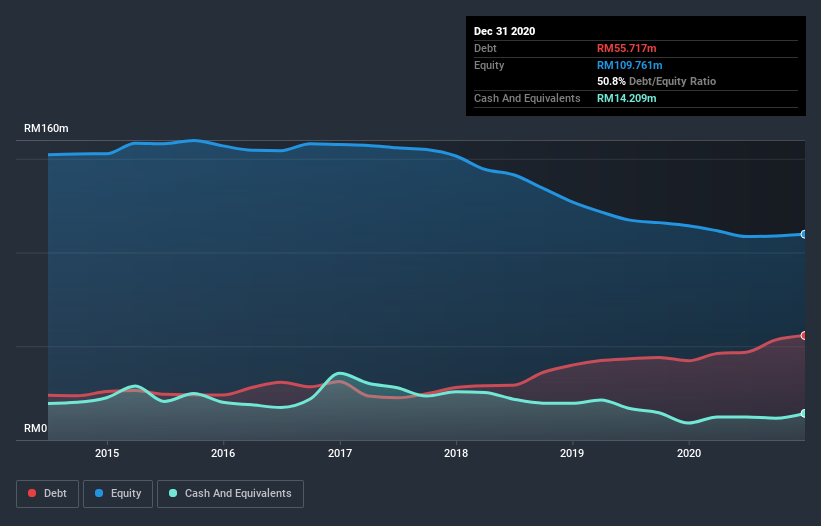We Think YLI Holdings Berhad (KLSE:YLI) Has A Fair Chunk Of Debt

Warren Buffett famously said, 'Volatility is far from synonymous with risk.' So it might be obvious that you need to consider debt, when you think about how risky any given stock is, because too much debt can sink a company. We can see that YLI Holdings Berhad (KLSE:YLI) does use debt in its business. But should shareholders be worried about its use of debt?
Why Does Debt Bring Risk?
Debt is a tool to help businesses grow, but if a business is incapable of paying off its lenders, then it exists at their mercy. If things get really bad, the lenders can take control of the business. However, a more usual (but still expensive) situation is where a company must dilute shareholders at a cheap share price simply to get debt under control. Having said that, the most common situation is where a company manages its debt reasonably well - and to its own advantage. When we think about a company's use of debt, we first look at cash and debt together.
Check out our latest analysis for YLI Holdings Berhad
What Is YLI Holdings Berhad's Debt?
The image below, which you can click on for greater detail, shows that at December 2020 YLI Holdings Berhad had debt of RM55.7m, up from RM42.3m in one year. However, because it has a cash reserve of RM14.2m, its net debt is less, at about RM41.5m.

A Look At YLI Holdings Berhad's Liabilities
Zooming in on the latest balance sheet data, we can see that YLI Holdings Berhad had liabilities of RM96.9m due within 12 months and liabilities of RM1.17m due beyond that. Offsetting this, it had RM14.2m in cash and RM56.6m in receivables that were due within 12 months. So it has liabilities totalling RM27.2m more than its cash and near-term receivables, combined.
This deficit is considerable relative to its market capitalization of RM38.6m, so it does suggest shareholders should keep an eye on YLI Holdings Berhad's use of debt. Should its lenders demand that it shore up the balance sheet, shareholders would likely face severe dilution. There's no doubt that we learn most about debt from the balance sheet. But it is YLI Holdings Berhad's earnings that will influence how the balance sheet holds up in the future. So when considering debt, it's definitely worth looking at the earnings trend. Click here for an interactive snapshot.
Over 12 months, YLI Holdings Berhad made a loss at the EBIT level, and saw its revenue drop to RM95m, which is a fall of 9.8%. We would much prefer see growth.
Caveat Emptor
Importantly, YLI Holdings Berhad had an earnings before interest and tax (EBIT) loss over the last year. To be specific the EBIT loss came in at RM1.8m. Considering that alongside the liabilities mentioned above does not give us much confidence that company should be using so much debt. So we think its balance sheet is a little strained, though not beyond repair. However, it doesn't help that it burned through RM7.6m of cash over the last year. So in short it's a really risky stock. When analysing debt levels, the balance sheet is the obvious place to start. But ultimately, every company can contain risks that exist outside of the balance sheet. For example, we've discovered 2 warning signs for YLI Holdings Berhad that you should be aware of before investing here.
When all is said and done, sometimes its easier to focus on companies that don't even need debt. Readers can access a list of growth stocks with zero net debt 100% free, right now.
If you’re looking to trade YLI Holdings Berhad, open an account with the lowest-cost* platform trusted by professionals, Interactive Brokers. Their clients from over 200 countries and territories trade stocks, options, futures, forex, bonds and funds worldwide from a single integrated account. Promoted
New: Manage All Your Stock Portfolios in One Place
We've created the ultimate portfolio companion for stock investors, and it's free.
• Connect an unlimited number of Portfolios and see your total in one currency
• Be alerted to new Warning Signs or Risks via email or mobile
• Track the Fair Value of your stocks
This article by Simply Wall St is general in nature. It does not constitute a recommendation to buy or sell any stock, and does not take account of your objectives, or your financial situation. We aim to bring you long-term focused analysis driven by fundamental data. Note that our analysis may not factor in the latest price-sensitive company announcements or qualitative material. Simply Wall St has no position in any stocks mentioned.
*Interactive Brokers Rated Lowest Cost Broker by StockBrokers.com Annual Online Review 2020
Have feedback on this article? Concerned about the content? Get in touch with us directly. Alternatively, email editorial-team (at) simplywallst.com.
About KLSE:YLI
YLI Holdings Berhad
An investment holding company, manufactures and trades in ductile iron pipes, steel and plastic pipes and fittings, and waterworks related products for the sewerage and waterworks industries in Malaysia, Singapore, and Vietnam.
Adequate balance sheet and slightly overvalued.
Market Insights
Community Narratives




